-
Countries
-
Data and Analysis
-
Special Focus
-
Crisis Responses
Contact
dtmlibya@iom.int
Location
Libya
Activity
- Mobility Tracking
- Baseline Assessment
Period Covered
Mar 01 2023 -Apr 30 2023
A baseline assessment is a sub-component of mobility tracking. It aims to collect data on IDP, migrant or returnee population presence in a defined administrative area of the country.
Population Groups
Survey Methodology
Unit of Analysis Or Observation
Type of Survey or Assessment
Keywords
Geographical Scope
Administrative boundaries with available data
The current dataset covers the following administrative boundaries
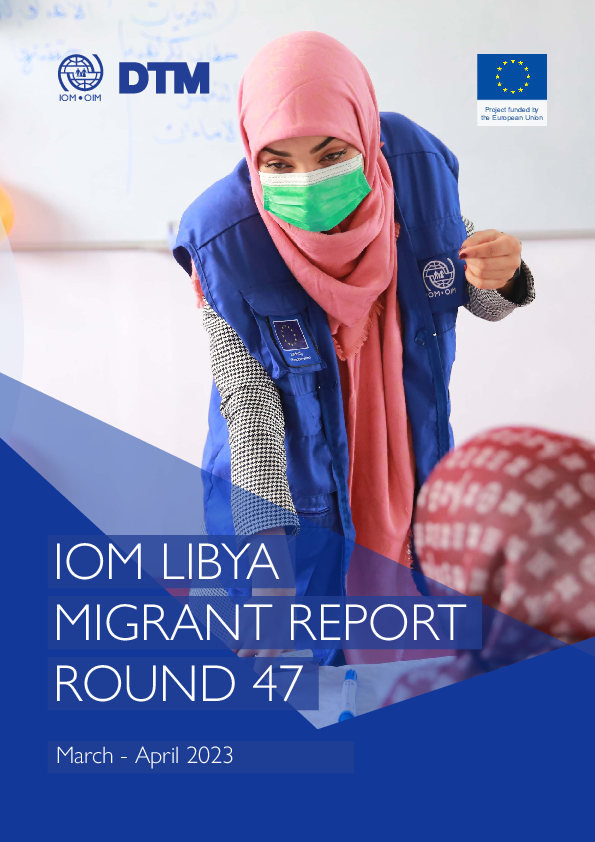
Contact
DTM Libya, DTMLibya@iom.int
Language
English
Location
Libya
Period Covered
Mar 01 2023
Apr 30 2023
Activity
- Mobility Tracking
- Baseline Assessment
This publication presents DTM Libya Round 47 Migrant Information Package, covering the reporting period March – April 2023. Round 47 includes DTM Libya Migrant Report, Key Findings Factsheet and Migrant Baseline and Flow Monitoring Dataset. During this round of data collection IOM identified at least 705,046 migrants present in Libya.
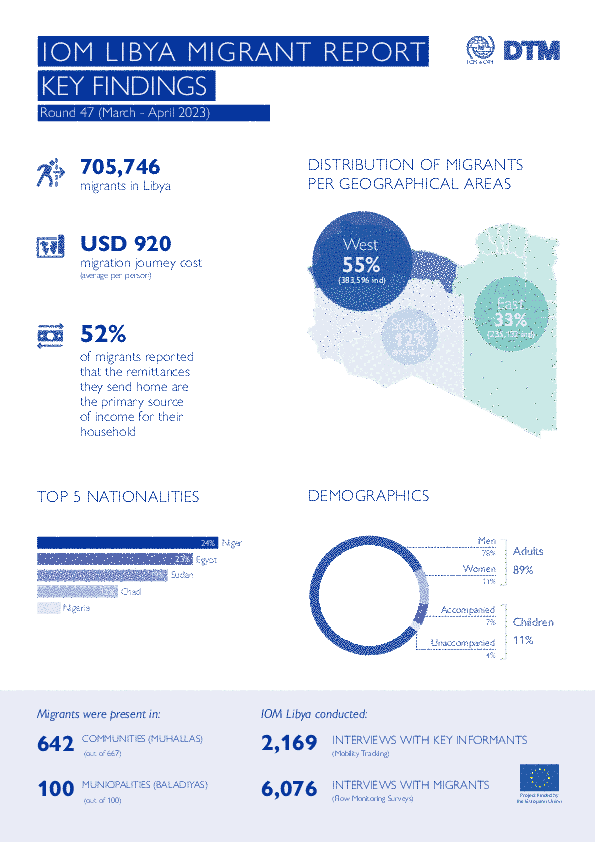
Contact
DTM Libya, DTMLibya@iom.int
Language
English
Location
Libya
Period Covered
Mar 01 2023
Apr 30 2023
Activity
- Flow Monitoring
- Mobility Tracking
- Baseline Assessment
This infographic presents the key findings of Round 47 of the mobility tracking component of the Displacement Tracking Matrix (DTM) programme in Libya.
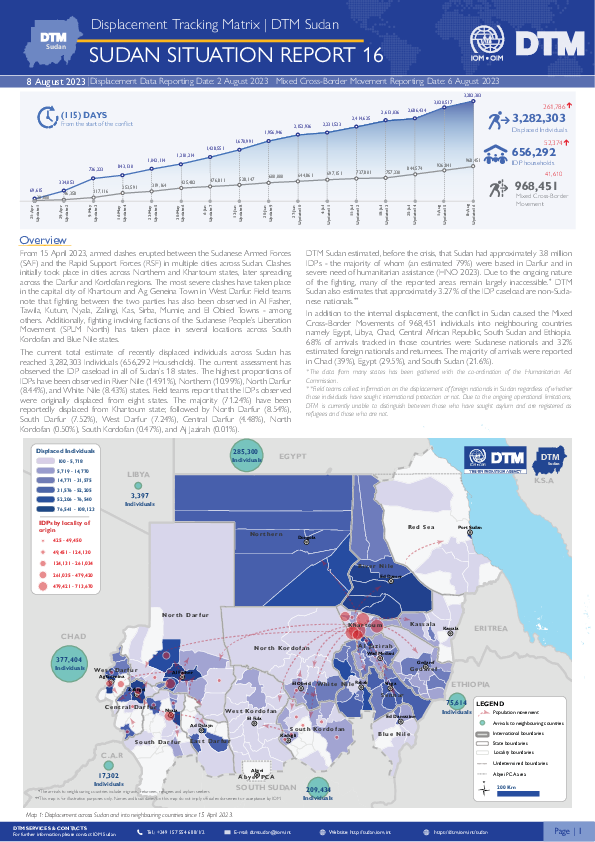
Contact
DTM Sudan; dtmsudan@iom.int
Language
English
Location
Sudan
Snapshot Date
Aug 01 2023
Activity
- Mobility Tracking
- Baseline Assessment
Overview
From 15 April 2023, armed clashes erupted between the Sudanese Armed Forces (SAF) and the Rapid Support Forces (RSF) in multiple cities across Sudan. Clashes initially took place in cities across Northern and Khartoum states, later spreading across the Darfur and Kordofan regions. Since Situation Report 15, the field team has reported outbreaks of violence across Sirba Town in Sirba locality, West Darfur.
Highlights
- The current total estimate of recently displaced individuals across Sudan has reached 3,282,303 Individuals (656,292 Households).
- The current assessment has observed the IDP caseload in all of Sudan’s 18 states. The highest proportions of IDPs have been observed in River Nile (14.91%), Northern (10.99%), North Darfur (8.44%), and White Nile (8.43%) states.
- Field teams report that the IDPs observed were originally displaced from eight states. The majority (71.24%) have been reportedly displaced from Khartoum state; followed by North Darfur (8.54%), South Darfur (7.52%), West Darfur (7.24%), Central Darfur (4.48%), North Kordofan (0.50%), South Kordofan (0.47%), and Aj Jazirah (0.01%).
- In addition to the internal displacement, the conflict in Sudan has caused the Mixed Cross-Border Movements of 968,451 individuals into neighbouring countries.
Contact
iomastana@iom.int iomalmaty@iom.int
Location
Kazakhstan
Activity
- Mobility Tracking
- Baseline Assessment
Period Covered
Mar 01 2023 -Apr 30 2023
The number of international migrant workers arrived in the first quarter of 2023 was 56,112, which totals to 724,534 international migrants being assessed by IOM Kazakhstan in the period of 2020 - 2023. The top five countries of origin of international migrant workers in Kazakhstan were Uzbekistan (86%), the Russian Federation (10%), Tajikistan (5%), Kyrgyzstan (3%) and Azerbaijan (2%). The following regions hosted the largest number of the international migrant workers in 2023: Almaty city (27%), Mangystau (23%), Astana city (15%), Almaty Oblast (13%) and Karaganda (5%).
Population Groups
Survey Methodology
Unit of Analysis Or Observation
Type of Survey or Assessment
Keywords
Geographical Scope
Administrative boundaries with available data
The current dataset covers the following administrative boundaries
Contact
GANBAT GERELTOGTOKH Location
Mongolia
Activity
- Mobility Tracking
- Baseline Assessment
Period Covered
Sep 01 2022 -Feb 28 2023
At the time of the round 3 assessment, there were 1,640,758 individuals and 474,198 households living in Ulaanbaatar city. Fifty-three per cent were women and 47 per cent were men. A significant 35 per cent of the population registered as minors: 12 per cent aged 0–5 years, and 23 per cent aged 6–17 years. Adults aged 18–59 years accounted for 56 per cent of the population, whereas the elderly aged 60 years and above accounted for nine per cent.
Population Groups
Survey Methodology
Unit of Analysis Or Observation
Type of Survey or Assessment
Keywords
Geographical Scope
Administrative boundaries with available data
The current dataset covers the following administrative boundaries
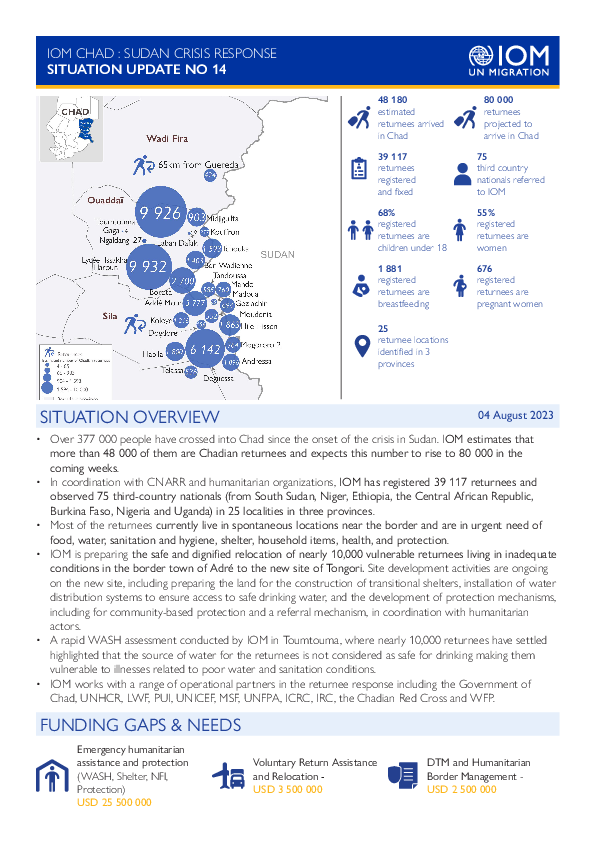
Contact
DTM Chad, dtmtchad@iom.int
Language
English
Location
Chad
Period Covered
Aug 04 2023
Aug 04 2023
Activity
- Flow Monitoring Survey
- Flow Monitoring
Over 377 000 people have crossed into Chad since the onset of the crisis in Sudan. IOM estimates that more than 48 000 of them are Chadian returnees and expects this number to rise to 80 000 in the coming weeks. In coordination with CNARR and humanitarian organizations, IOM has registered 39 117 returnees and observed 75 third-country nationals (from South Sudan, Niger, Ethiopia, the Central African Republic, Burkina Faso, Nigeria and Uganda) in 25 localities in three provinces. Most of the returnees currently live in spontaneous locations near the border and are in urgent need of food, water, sanitation and hygiene, shelter, household items, health, and protection.
IOM is preparing the safe and dignified relocation of nearly 10,000 vulnerable returnees living in inadequate conditions in the border town of Adré to the new site of Tongori. Site development activities are ongoing on the new site, including preparing the land for the construction of transitional shelters, installation of water distribution systems to ensure access to safe drinking water, and the development of protection mechanisms, including for community-based protection and a referral mechanism, in coordination with humanitarian actors. A rapid WASH assessment conducted by IOM in Toumtouma, where nearly 10,000 returnees have settled highlighted that the source of water for the returnees is not considered as safe for drinking making them vulnerable to illnesses related to poor water and sanitation conditions.
IOM works with a range of operational partners in the returnee response including the Government of Chad, UNHCR, LWF, PUI, UNICEF, MSF, UNFPA, ICRC, IRC, the Chadian Red Cross and WFP.
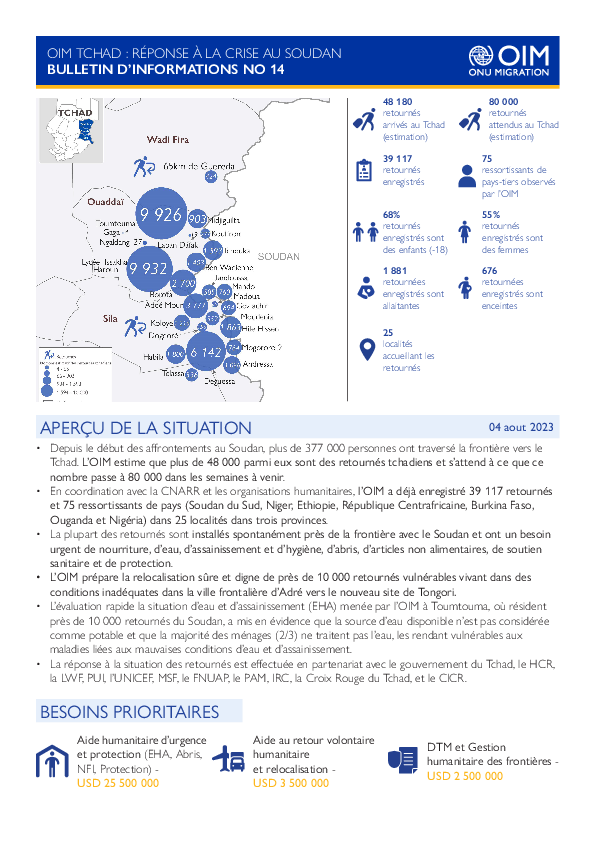
Contact
DTM Chad, dtmtchad@iom.int
Language
French
Location
Chad
Period Covered
Aug 04 2023
Aug 04 2023
Activity
- Flow Monitoring Survey
- Flow Monitoring
Depuis le début des affrontements au Soudan, plus de 377 000 personnes ont traversé la frontière vers le Tchad. L’OIM estime que plus de 48 000 parmi eux sont des retournés tchadiens et s’attend à ce que ce nombre passe à 80 000 dans les semaines à venir. En coordination avec la CNARR et les organisations humanitaires, l’OIM a déjà enregistré 39 117 retournés et 75 ressortissants de pays (Soudan du Sud, Niger, Ethiopie, République Centrafricaine, Burkina Faso, Ouganda et Nigéria) dans 25 localités dans trois provinces. La plupart des retournés sont installés spontanément près de la frontière avec le Soudan et ont un besoin urgent de nourriture, d’eau, d’assainissement et d’hygiène, d’abris, d’articles non alimentaires, de soutien sanitaire et de protection.
L’OIM prépare la relocalisation sûre et digne de près de 10 000 retournés vulnérables vivant dans des conditions inadéquates dans la ville frontalière d’Adré vers le nouveau site de Tongori. L’évaluation rapide la situation d’eau et d’assainissement (EHA) menée par l’OIM à Toumtouma, où résident près de 10 000 retournés du Soudan, a mis en évidence que la source d’eau disponible n’est pas considérée comme potable et que la majorité des ménages (2/3) ne traitent pas l’eau, les rendant vulnérables aux maladies liées aux mauvaises conditions d’eau et d’assainissement.
La réponse à la situation des retournés est effectuée en partenariat avec le gouvernement du Tchad, le HCR, la LWF, PUI, l’UNICEF, MSF, le FNUAP, le PAM, IRC, la Croix Rouge du Tchad, et le CICR.
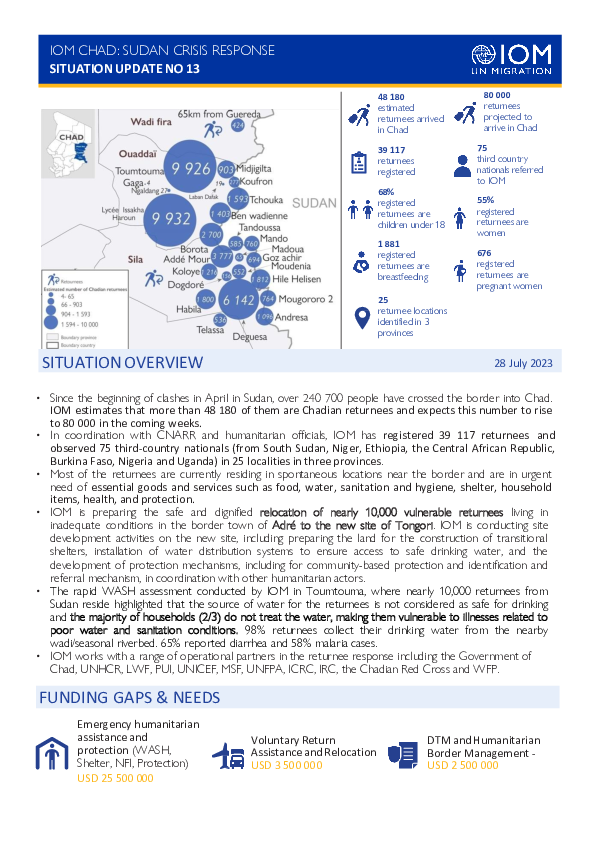
Contact
DTM Chad, dtmtchad@iom.int
Language
English
Location
Chad
Period Covered
Jul 28 2023
Jul 28 2023
Activity
- Flow Monitoring Survey
- Flow Monitoring
Since the beginning of clashes in April in Sudan, over 240 700 people have crossed the border into Chad. IOM estimates that more than 48 180 of them are Chadian returnees and expects this number to rise to 80 000 in the coming weeks. In coordination with CNARR and humanitarian officials, IOM has registered 39 117 returnees and observed 75 third-country nationals (from South Sudan, Niger, Ethiopia, the Central African Republic, Burkina Faso, Nigeria and Uganda) in 25 localities in three provinces. Most of the returnees are currently residing in spontaneous locations near the border and are in urgent need of essential goods and services such as food, water, sanitation and hygiene, shelter, household items, health, and protection.
IOM is preparing the safe and dignified relocation of nearly 10,000 vulnerable returnees living in inadequate conditions in the border town of Adré to the new site of Tongori. IOM is conducting site development activities on the new site, including preparing the land for the construction of transitional shelters, installation of water distribution systems to ensure access to safe drinking water, and the development of protection mechanisms, including for community-based protection and identification and referral mechanism, in coordination with other humanitarian actors. The rapid WASH assessment conducted by IOM in Toumtouma, where nearly 10,000 returnees from Sudan reside highlighted that the source of water for the returnees is not considered as safe for drinking and the majority of households (2/3) do not treat the water, making them vulnerable to illnesses related to poor water and sanitation conditions. 98% returnees collect their drinking water from the nearby wadi/seasonal riverbed. 65% reported diarrhea and 58% malaria cases.
IOM works with a range of operational partners in the returnee response including the Government of Chad, UNHCR, LWF, PUI, UNICEF, MSF, UNFPA, ICRC, IRC, the Chadian Red Cross and WFP.
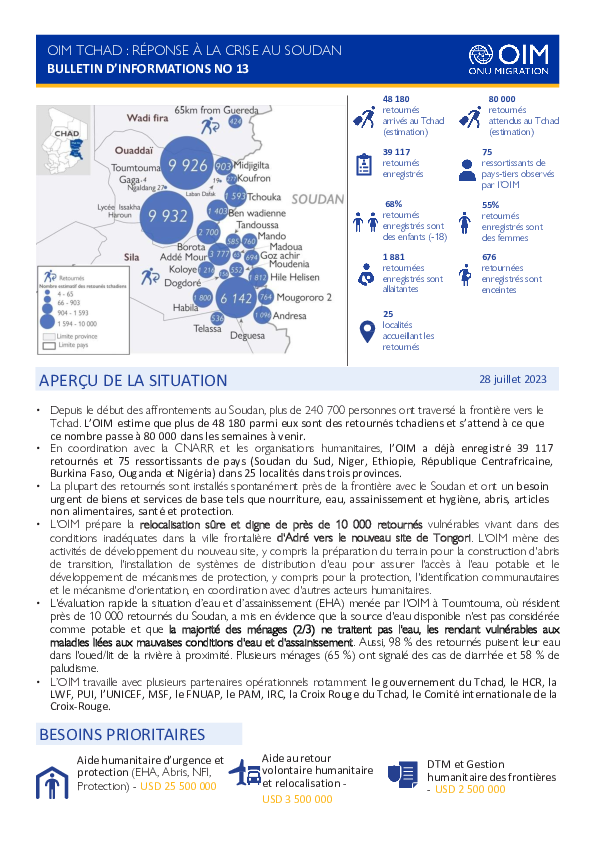
Contact
DTM Chad, dtmtchad@iom.int
Language
French
Location
Chad
Period Covered
Jul 28 2023
Jul 28 2023
Activity
- Flow Monitoring Survey
- Flow Monitoring
Depuis le début des affrontements au Soudan, plus de 240 700 personnes ont traversé la frontière vers le Tchad. L’OIM estime que plus de 48 180 parmi eux sont des retournés tchadiens et s’attend à ce que ce nombre passe à 80 000 dans les semaines à venir. En coordination avec la CNARR et les organisations humanitaires, l’OIM a déjà enregistré 39 117 retournés et 75 ressortissants de pays (Soudan du Sud, Niger, Ethiopie, République Centrafricaine, Burkina Faso, Ouganda et Nigéria) dans 25 localités dans trois provinces. La plupart des retournés sont installés spontanément près de la frontière avec le Soudan et ont un besoin urgent de biens et services de base tels que nourriture, eau, assainissement et hygiène, abris, articles non alimentaires, santé et protection.
L'OIM prépare la relocalisation sûre et digne de près de 10 000 retournés vulnérables vivant dans des conditions inadéquates dans la ville frontalière d'Adré vers le nouveau site de Tongori. L'OIM mène des activités de développement du nouveau site, y compris la préparation du terrain pour la construction d'abris de transition, l'installation de systèmes de distribution d'eau pour assurer l'accès à l'eau potable et le développement de mécanismes de protection, y compris pour la protection, l'identification communautaires et le mécanisme d'orientation, en coordination avec d'autres acteurs humanitaires. L'évaluation rapide la situation d’eau et d’assainissement (EHA) menée par l'OIM à Toumtouma, où résident près de 10 000 retournés du Soudan, a mis en évidence que la source d'eau disponible n'est pas considérée comme potable et que la majorité des ménages (2/3) ne traitent pas l'eau, les rendant vulnérables aux maladies liées aux mauvaises conditions d'eau et d'assainissement. Aussi, 98 % des retournés puisent leur eau dans l'oued/lit de la rivière à proximité. Plusieurs ménages (65 %) ont signalé des cas de diarrhée et 58 % de paludisme.
L’OIM travaille avec plusieurs partenaires opérationnels notamment le gouvernement du Tchad, le HCR, la LWF, PUI, l’UNICEF, MSF, le FNUAP, le PAM, IRC, la Croix Rouge du Tchad, le Comité internationale de la Croix-Rouge
